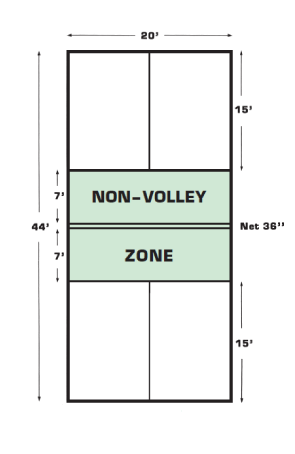
How to play
Basic overview
Pickle-ball® is played on a badminton-sized court: 6m x 13m. The ball is served diagonally (starting with the right-hand service-square), and points can only be scored by the side that serves.
Players on each side must let the ball bounce once before volleys are allowed, and there is a seven-foot no-volley zone on each side of the net, to prevent “spiking.” The server continues to serve, alternating service courts, until he or she faults. The first side scoring eleven points and leading by at least two points wins. Pickle-ball® can be played with singles or doubles.
The Pickleball serve
Serves are to be made diagonally, starting with the right-hand service-square and alternating each serve. The serve must clear the seven-foot non-volley-zone in front of the net and land in the diagonal service court.
Serves should always be done underhand with the paddle below the waist, and the server must keep both feet behind the back line when serving. The ball should be hit into the air without being bounced. The serving side will continue to serve until the there is a fault on the service, at which point the service will be given to the opposing side. (However, if the ball touches the net but still lands within the appropriate service court, the serve may be taken over.)
The Server must keep both feet behind the back line when serving. The service is made underhand with the paddle contacting the ball below the waist. The Server must hit the ball in the air on the serve. The Server is NOT allowed to bounce the ball and hit it off the bounce. The service is made diagonally cross court and must clear the non-volley zone, including the line (A serve that hits the non-volley zone line is out) Only one serve attempt is allowed, except if the ball touches the net on the serve and lands in the proper service court,in this case the serve may be taken over. At the start of each new game, the 1st serving team is allowed only one fault before giving up the ball to the opponents. Thereafter both members of each team will serve and fault before the ball is turned over to the opposing team. When the receiving team wins the serve, the player in the right hand court will always start play.
Volleys
To volley means to hit a ball in the air without first letting it bounce. In Pickle-ball®, this can only be done when the player’s feet are behind the non-volley zone line (seven feet behind the net). Note: Is is a fault if the player steps over the line on his volley follow-through.
Double-bounce rule
Also called the Two Bounce Rule, each team must play their first shot off of the bounce. That is, the receiving team must let the serve bounce and the serving team must let the return of the serve bounce before playing it. Once these two bounces have occurred, the ball can either be volleyed or played off the bounce.
Fault
A fault is committed when the ball:
Touches any part of the non-volley zone on the serve (including the line).
Is hit out of bounds
Does not clear the net
Is volleyed from the non-volley zone
Is volleyed before a bounce has occurred on each side
Scoring
A team can score a point only when serving. A player who is serving shall continue to do so until a fault is made by his/her team. If playing doubles, each player on a team shall keep serving until their team makes a fault, then the serve moves to the opposing team - this is called a Side Out. The game is played to 11 points, however a team must win by 2 points.
Player position for doubles at start of game
Double play positioning movements
In Image A below, you can see that Server (player 1) serves from the right hand side of the serving team's court diagonally across court to the Receiver (player 3)in the opposite right hand side of the court. The receiver (player 3) must let the ball bounce before returning the serve. The serving team must also let the return bounce before playing it (the Double Bounce Rule). After two bounces have occurred, the ball may then be either volleyed or played off the bounce until a fault is made.
In Image B below, you can see that after a fault is made by the receiving team, and a point is scored by the serving team, the serving team's players switch sides of court and the same player will continue to serve. When the serving team makes its first fault, the serving team's players will stay in the same side of the court, and the second partner will then serve. When they make their second fault, they will stay in their same court positions, and turn the ball over to the other team. Players switch sides of the court only after scoring.






